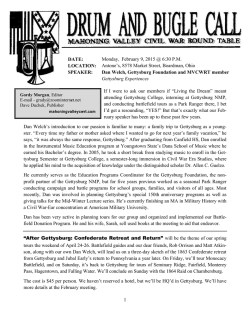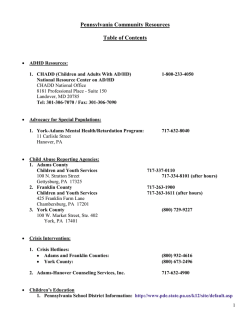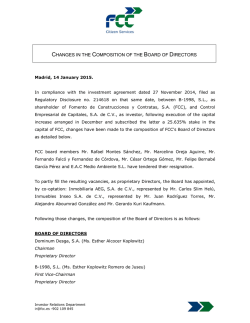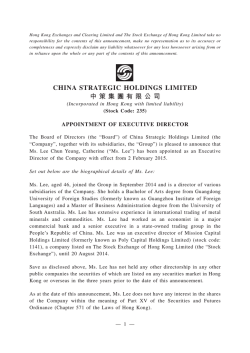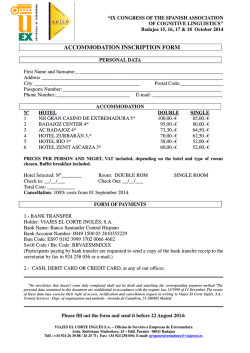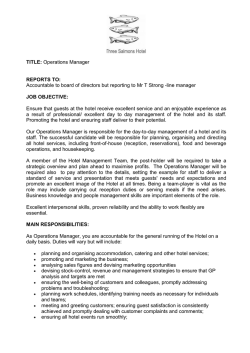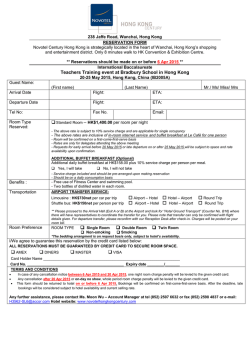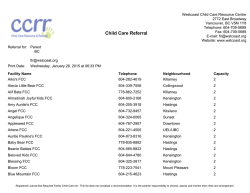
Event Details
MAY 19-20, 2015 www.gettysburgleadershipexperience.com || 1 TUESDAY, MAY 19, 2015 6:45 a.m. to 7:30 a.m. Breakfast at Hotel Grand Ballroom (Participants only) 7:30 a.m. to 8 a.m. Welcome & Program Overview Eisenhower Room FCC Services 8 a.m. to Noon Anticipatory Leadership Eisenhower Room The High Ground Instructor: Ambassador Lawrence Taylor Trip to Battlefield: McPherson’s Ridge with Guide Noon to 1 p.m. Grand Ballroom Lunch at Hotel (Participants only) 1 p.m. to 5 p.m. Transactional & Transformational Leadership Hotel Lobby The Left Flank Instructor: William Rosenbach, PhD Trip to Battlefield: Little Round Top with Guide 6:15 p.m. Hotel Lobby Meet in the lobby for group transportation to dinner 6:30 p.m. to 8 p.m. Group Reception and Dinner 8:15 p.m. Group transportation returns to Hotel www.gettysburgleadershipexperience.com || 2 WEDNESDAY, MAY 20, 2015 7 a.m. to 7:45 a.m. Breakfast at Hotel Grand Ballroom (Participants only) 7:45 a.m. to Noon Clarity of Communication Eisenhower Room Lee and His Generals Instructor: Chuck Burkell Trip to Battlefield: Cemetery Ridge Noon to 1 p.m. Grand Ballroom Lunch at Hotel (Participants only) 1 p.m. to 4:45 p.m. Predictable Surprises Lee and Longstreet at the Moment of Decision Instructor: Chuck Burkell Trip to Battlefield: Pickett’s Charge 4:45 p.m. to 5 p.m. Wrap-up FCC Services Attire/Footwear: Attire is Battlefield Casual (jeans and sneakers) during the program and Business Casual for the group dinner. Pickett’s Charge is a one mile walk through often muddy fields. If anyone is unable to walk this distance, they may ride on the bus with an instructor to narrate, and meet the group at The Angle for conclusion. To ensure an optimum learning experience, we suggest you obtain copies of the following material and view them prior to arriving to the event. Read The Killer Angels by Michael Shaara and/or watch Gettysburg (a movie starring Martin Sheen, Jeff Daniels and Tom Berenger). The book or movie can be obtained from your local library or purchased in physical copy or downloaded from a variety of online sources (Amazon, iTunes, Books A Million, Walmart, etc.). www.gettysburgleadershipexperience.com || 3 MODULE: ANTICIPATORY LEADERSHIP Seize your strategic advantage. General John Buford and General John Reynolds leveraged higher-elevation landscape and other assets to maximize their Day 1 position.How can you claim your “high ground?” Case Study: The High Ground General John Buford of the Union Calvary was the first to see General Robert E. Lee has led the Army of Northern Virginia into Pennsylvania. Recognizing the strategic advantage within reach, he orchestrated a staged sequence of “fight and drop back.” At the close of Day One, the Union line was indeed back, suggesting a victory for the South. But Buford’s initial strategy allowed the Union Army to set up a defensive line on the other side of Gettysburg—the high ground. Some insist his foresight and execution won the battle of Gettysburg. MODULE: TRANSACTIONAL & TRANSFORMATIONAL LEADERSHIP Identify your areas of highest risk. Colonel Joshua Chamberlain faced a stark choice: to stay and fight with no ammo or retreat and leave the entire Army exposed. How do you decide when to hold firm in the face of strong opposition? Case Study: The Left Flank On Day Two of the battle, Colonel Joshua Lawrence Chamberlain was challenged to hold the left flank of the Union position at Little Round Top at all costs. His actions embodied a modern model of leadership merging transactional (equitable exchange of rewards for behavior expected) and transformational (clarifying vision and purpose motivating others). The combination resulted in his troop’s accomplishing the seemingly impossible and the college professor-turned-soldier’s being revered decades later. MODULE: CLARITY OF COMMUNICATION Utilize common language and direct communication for the purpose of understanding. Because General Lee’s leadership team at Gettysburg was relatively new, communication and performance suffered. How can you keep dialog direct as transition occurs? Case Study: Lee and His Generals When Robert E. Lee led his troops to Gettysburg, he did so with a relatively new leadership team. Stonewall Jackson, his trusted advisor, had been mortally wounded. General J.E.B. Stuart, commander of the Army of Northern Virginia’s cavalry, was supposedly off on a raid in enemy territory, leaving Lee blind to the movements of the Union Army. This module deals with the transition of the new generals in their roles, effective communication and issues relating to performance management. www.gettysburgleadershipexperience.com || 4 MODULE: PREDICTABLE SURPRISES Beware the blind spots of success. After a string of victories and leadership changes, Day 3—one of the most hotly debated points in Gettysburg history—proved a turning point for the Confederates. How can you maintain focus when success sparks powerful momentum? Case Study: Lee and Longstreet at the Moment of Decision One of the most important tasks a leader must master is decision making in the midst of change. Using Day 3 of the battle and the discussions that lead to the fateful Pickett’s Charge as the backdrop, this case study focuses participants on the potential pitfalls of success and how to gather information before the moment of decision. www.gettysburgleadershipexperience.com || 5 Jean Cantey Segal Senior Vice President, Organizational Effectiveness, FCC Services Jean Cantey Segal is the Senior Vice President of Organizational Effectiveness for FCC Services. In her current role, she provides strategic leadership, management, and oversight to an experienced consulting team that brings enriching development programs to individuals, executives, and directors to increase the performance of their organizations and strengthen their boards of directors. Cindy Knutson Vice President, Organizational Effectiveness, FCC Services Cindy is Vice President of Organizational Effectiveness Consulting. She is responsible for researching, creating and implementing new programs for Boards of Directors and individual director effectiveness. Cindy consults with CEOs and Boards of Directors on Board Evaluation and Director Peer Evaluation. She facilitates robust working sessions with boards that invites director involvement and results in insightful discussion and clear action steps. Cindy also consults with CEOs and Boards on succession planning, strategic planning and leadership development. Sarah Spivey Senior Consultant, FCC Services Sarah E. Spivey is a senior consultant for FCC Services. In her current role, she works in organizational development and education assisting current and future agriculture and Farm Credit leaders to further their leadership skill sets. Sarah’s role includes facilitating and teaching programs, such as the Leadership Development Program, Gettysburg Leadership Experience, and Crucial Conversations, as well as assisting in other programs in both a facilitation and trainer role. Bill Wilson Director, Agribusiness Consulting, FCC Services Bill Wilson serves as Director of Agribusiness Consulting for FCC Services. He has 35 years of experience working for and with agricultural cooperatives, privately-owned and publicly-traded food and agribusiness firms. His background includes corporate finance, merger — acquisition advisory, business and financial strategy and corporate governance. Bill has experience in multiple agribusiness segments including grain handling and marketing, agronomy, feed, livestock marketing, energy, meat and dairy processing, fruit and vegetable processing and financial services. www.gettysburgleadershipexperience.com || 6 INSTRUCTORS Chuck Burkell Instructor/Guide He serves as a Consultant to FCC Services in support of The Gettysburg Leadership Experience Program. He is a Licensed Battlefield Guide at the Gettysburg National Military Park and has personally guided hundreds of executives and managers on the Battlefield during Staff Rides and other educational programs. Chuck has a Master’s of Business Administration (MBA) Degree from Mt. St. Mary’s University and a BS in Technical Education from the University of Akron. He and his wife Mary Jo reside within one mile of the Gettysburg National Military Park. Chuck has served as Associate Professor for Mt. St. Mary’s University within their Graduate Program of Business and as a supporting faculty member at the Kennedy School of Government – Harvard University within the The Art & Practice of Leadership Development Program. He has authored numerous journal articles, case studies, leadership curricula, and other publications. He co-designed the Adaptive Leadership Instrument with Cambridge Leadership Associates, a multi-rater leadership development assessment tool. Dr. William E. Rosenbach Transactional/Transformational Module Prelude and Discussion William E. Rosenbach is Evans Professor of Eisenhower Leadership Studies and Professor of Management Emeritus at Gettysburg College. He received his PhD from the University of Colorado-Boulder in 1977 in Business Administration (Organizational Behavior). Dr. Rosenbach served as the founding Chairperson of the Department of Management, Gettysburg College from 1984 to 1991 and 2000 to 2001. He was Professor and Head, Department of Behavioral Sciences and Leadership, US Air Force Academy from 1982 to 1984 and member of the faculty there from 1972 to 1984. Dr. Rosenbach’s research focuses on leader and follower behavior and development, effectiveness of leadership development programs, and the relationship of transformational leadership to organizational performance. He is a founding partner of The Gettysburg Leadership Experience, a unique executive leadership development program in Gettysburg, Pennsylvania. www.gettysburgleadershipexperience.com || 7 INSTRUCTORS (Continued) Ambassador Lawrence P. Taylor The High Ground Prelude and Discussion Lee and Longstreet Module Prelude and Discussion Lawrence P. Taylor is a former US Ambassador to Estonia, a post he held from 1995 to 1997. He has extensive experience in foreign affairs leadership, training, management, and policy development as a career diplomat with the US Department of State — both overseas and in the US. Taylor currently serves as a senior advisor to the president of Gettysburg College and is a founding partner of The Gettysburg Leadership Experience at Gettysburg College, a leadership development program for senior executives in the private and public sectors. In 2007, he was also appointed by Pennsylvania Governor Ed Rendell as a member of the PA Abraham Lincoln Bicentennial Commission. Prior to serving as ambassador, Taylor was director of the Foreign Service Institute/National Foreign Affairs Training Center in Virginia. He joined the Foreign Service in 1969. His overseas postings as a political and economic officer include Santo Domingo, Dominican Republic; Zagreb and Belgrade, Yugoslavia; Jakarta, Indonesia; Ottawa, Canada; and London, United Kingdom. www.gettysburgleadershipexperience.com || 8 GUIDES Terry G. Fox Guide Terry Fox is a 6th Generation of Gettysburg. He graduated from Gettysburg High School and received his undergraduate and graduate degrees from Shippensburg University of Pennsylvania. Mr. Fox taught American History for 33 years, 26 of those years in the Gettysburg School District. He served as Department Chair throughout his teaching career. He was head baseball coach, golf coach, and assistant varsity basketball coach. He was a member of the Carnegie Foundation for teaching American History in America during his high school years of teaching. Upon his retirement from high school, he served in the Gettysburg College Education Department, taught and observed student teachers and was named an Adjunct Professor by the college. He then joined a group of professors (Rosenbach & Associates) that continues to teach Leadership seminars to the USAF Chief Master Sergeants, FCC and the Internal Revenue Service. He presently is an adjunct professor at Johns Hopkins University graduate school. He teaches in the JHU Division of Public Safety Leadership. This involves seminar programs with the US Secret Service, the Drug Enforcement Administration, Immigration and Customs Enforcement, and the JHU Police Executive Leadership program. He recently was named an adjunct professor at Georgetown. He is a Battlefield Guide Emeritus with the Gettysburg National Military Park. Bob Prosperi Guide Bob Prosperi has been studying, teaching, or practicing the craft of history for more than 40 years. A US Army veteran and a 1976 graduate of Indiana University of Pennsylvania, Bob worked for many years at Gettysburg National Military Park, spending his last nine years there as one of the Park’s two Historians. After leaving the National Park Service Bob served as an Educator with the Pennsylvania Historical and Museum Commission, has been a Licensed Battlefield Guide since 1993 and has been involved with various leadership training institutes since the mid-1990’s. 888.ASK.FCCS [275.3227] || [email protected] || fccservices.com www.gettysburgleadershipexperience.com
© Copyright 2026
